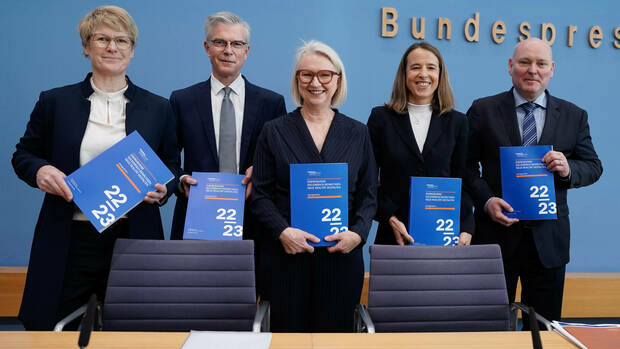Berlin Anyone who asks the language software ChatGPT to write an opinion “like the German Council of Economic Experts would do” only gets a few generalities: removing trade barriers, investing in education, combating climate change.
The German Advisory Council need not be afraid of artificial intelligence, even 60 years after it was founded. This Wednesday, the Economic Wise Men, as the five council members are commonly called, are celebrating their anniversary in Berlin. With Chancellor Olaf Scholz (SPD), Economics Minister Robert Habeck (Greens) and Bundesbank President Joachim Nagel, prominent speakers have announced their presence.
At the ceremony, however, the focus should be less on looking back and more on looking ahead. Because after almost three years, the biggest crisis of economic wisdom is over. At first, the ex-government of Union and SPD could not agree on the successor to former chairman Lars Feld, who left in February 2021. The Council was consequently decimated for almost a year and a half. Especially when Volker Wieland left the board in April 2022.
It was not until the late summer of last year that the federal government appointed Martin Werding and Ulrike Malmendier as successors. When the Economic Wise Men were five again, the question of who would chair the meeting still weighed on the mood. Ultimately, Monika Schnitzer prevailed with the minimum majority of three votes.
But the turbulent times for the board continue. The Council of Economic Experts has changed little institutionally in the 60 years of its existence. The world he examines, even more so. Business and politics have become faster, communication channels are shorter and more digital.
Advisory Council considers “Policy Briefs”
So far, this has not been reflected in the way the Council of Experts works. Once a year, in autumn, the council publishes its annual report. However, the Council agrees that the tome with several hundred pages is less and less appropriate to the real economic situation.
Institutionally, the Council has hardly changed in the past 60 years.
(Photo: Federal Archives/Gerhard Heisler/CC-BY-SA 3.0)
Instead of once a year concentrated, they want to speak up more often in the future. According to council circles, “policy briefs”, i.e. brief analyzes of current economic policy issues, are under discussion.
Thematically, the considerations for the first issues are in the direction of the US subsidy program Inflation Reduction Act and the European response to it.
In this way, the Council could make headlines more often in the future. He last managed to do that with the last annual report. At that time, economic experts suggested taxing top earners temporarily higher in order to compensate for the inaccuracies of the state gas price brake. Fiscal policy is likely to become a central point of discussion in the Council. Council members Veronika Grimm and Martin Werding are now skeptical about the proposal at the time, according to council circles.
Politicians also want to strengthen the Council’s position. The economic policy spokesman for the FDP, Reinhard Houben, proposes in a paper that is available to the Handelsblatt that the federal government submit an annual update on which suggestions from the economic experts it has implemented.
>> Read here: Economic experts speak out against industrial electricity prices
The members of the committee are also promoting a move to Berlin. The Advisory Council is based at the Federal Statistical Office in Wiesbaden – far away from the economic policy debates in Berlin.
Requests for a move to Berlin have been circulating in the council for years. With the departure of Feld, who teaches in Freiburg, and Wieland, who is based in Frankfurt, the path now seems clear. Several council meetings have recently taken place in Berlin. Now it’s a matter of convincing the Federal Statistical Office and the Federal Government of a permanent move.
Staff scientists little known
That should also make it easier to recruit economists for the staff behind the council. The scientists, currently around twenty, are hardly noticed by the public. However, they play an important role, writing a large part of the annual report and being responsible for the economic forecast.
At the beginning of this month, the Council of Economic Experts pulled off a coup: the editor-in-chief of the trade journal “Wirtschaftsdienst”, Christian Breuer, is moving to the Economic Wise Men’s staff. Breuer, who used to work at the Ifo Institute in Munich, turned down the offer from the German Institute for Economic Research (DIW) in Berlin last year to become co-head of the economics department.
More: Why Germany is in recession – four reasons
